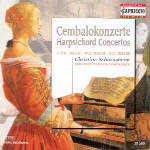This CD presents fiery, inspired performances of three harpsichord concertos by Johann Sebastian Bach’s sons. They are all daring works that helped point the way to the classical concerto, but the one by Carl Philipp Emanuel Bach seems especially bold and arresting. Its outer movements are fleet and dramatic; its slow movement moody and intense. The Wilhelm Friedemann Bach and Johann Christian Bach pieces are likewise exciting, if a little more introspective. Soloist Christine Schornsheim plays with controlled abandon, and the virtuoso string players make quite an impression with their spirited, secco playing on period instruments. The recording seems very close to perfect. Too often in music of this sort, the harpsichord is made to sound much too big. Since it is accompanied here by string quintet, rather than string orchestra, the engineers have been able to achieve a more realistic balance, with a close-up recording that makes you feel part of the action, which in this case is quite a thrill. I certainly wouldn’t mind hearing these forces play father Johann’s concertos sometime soon.
































